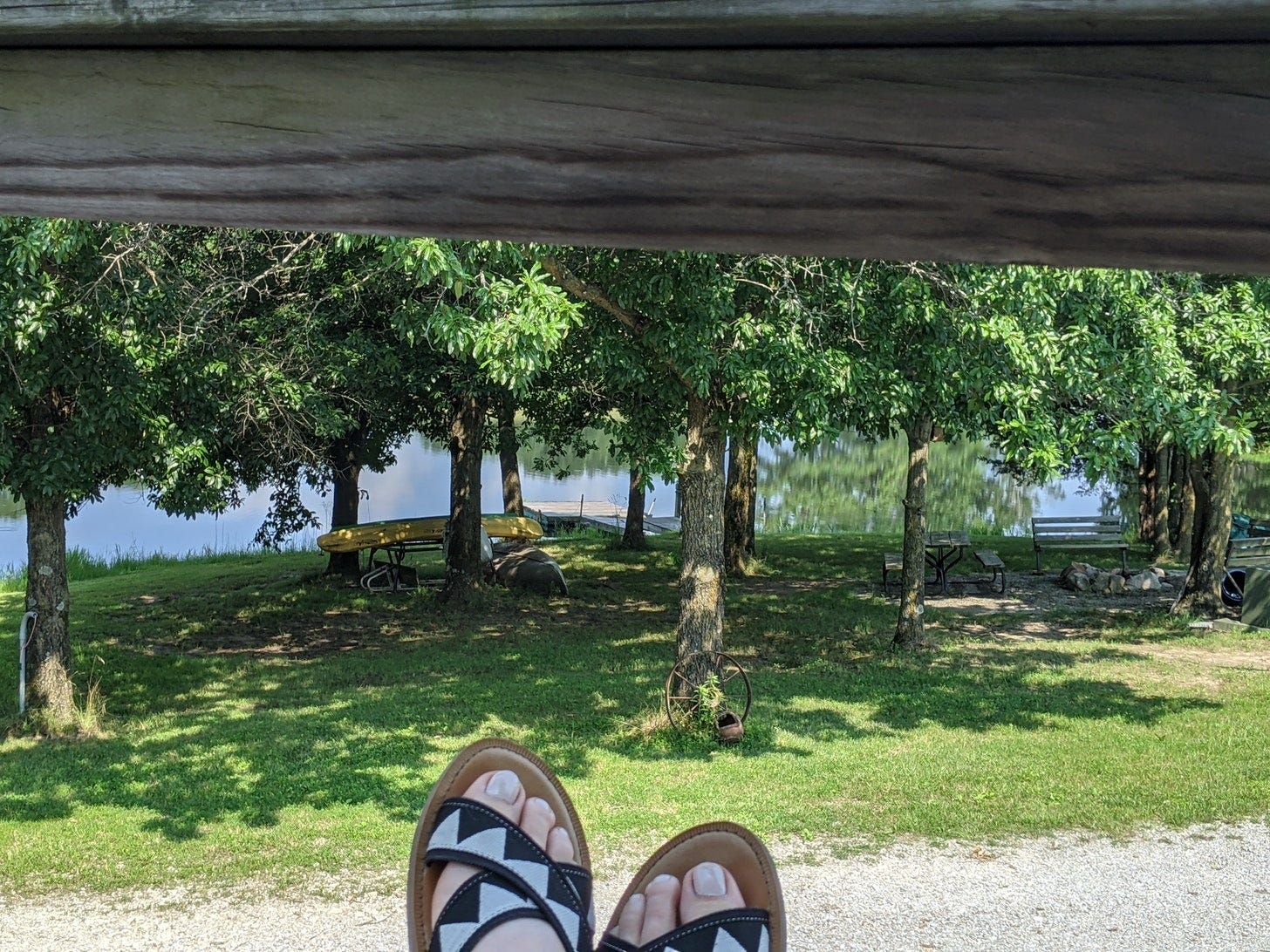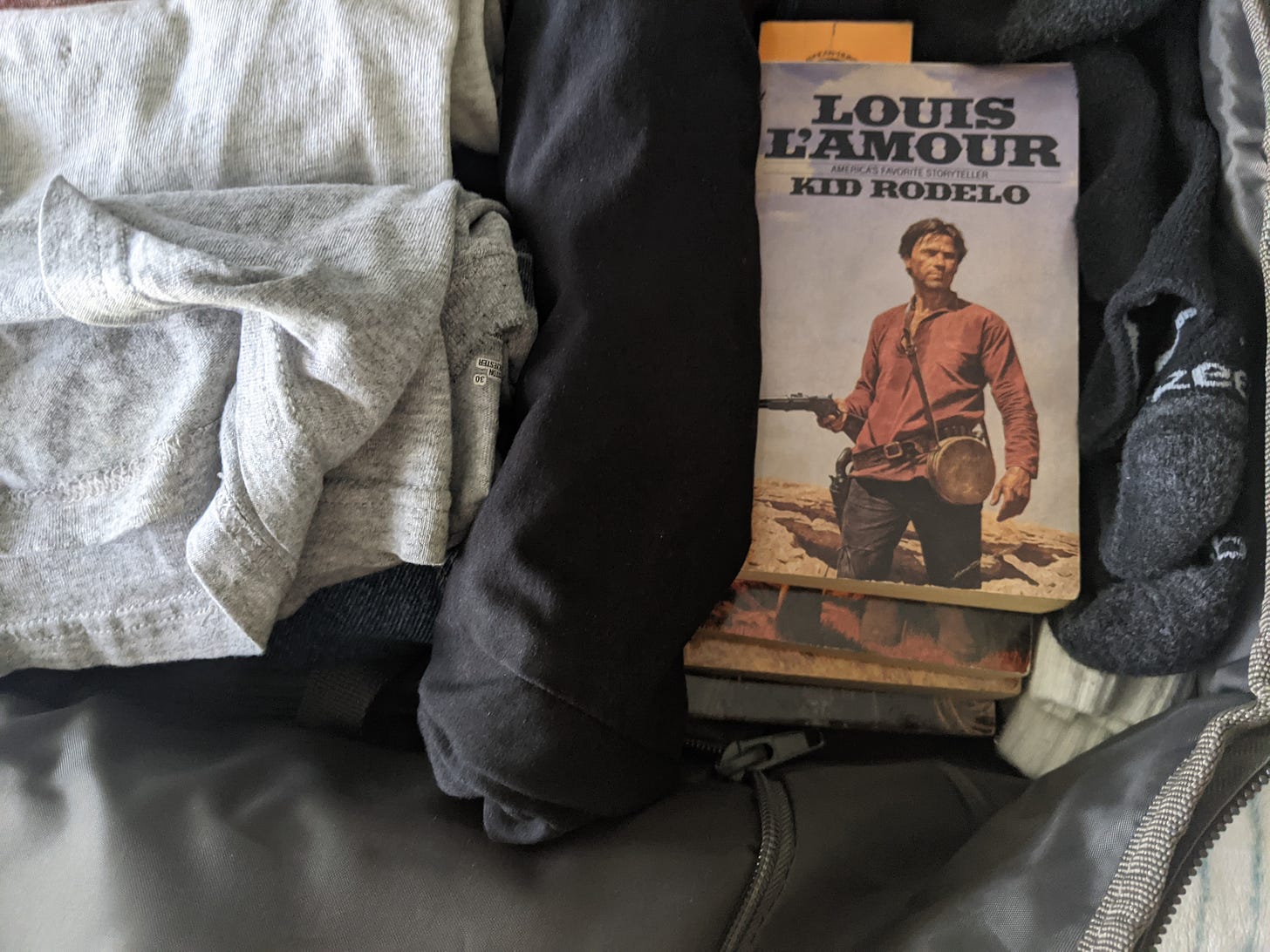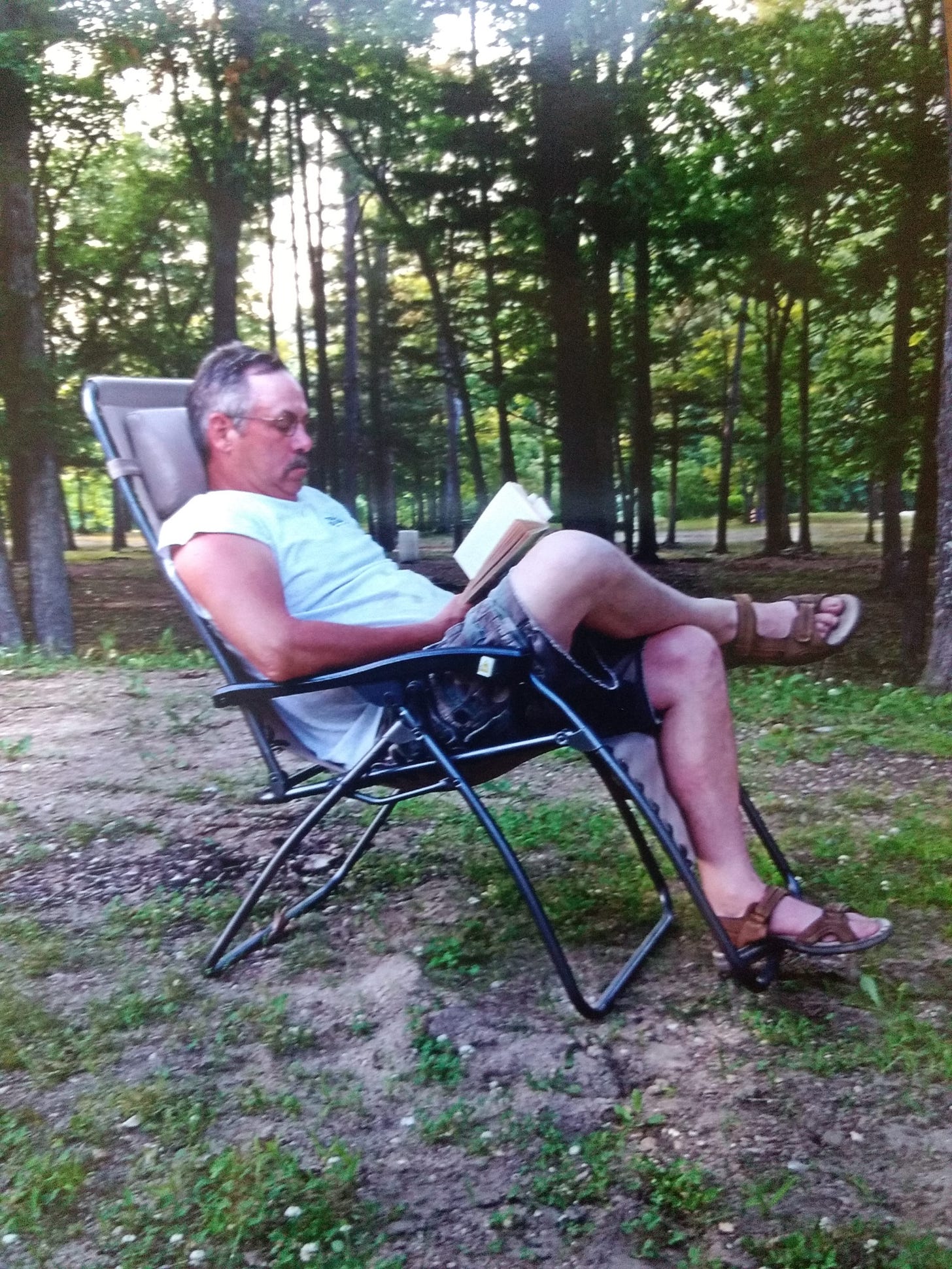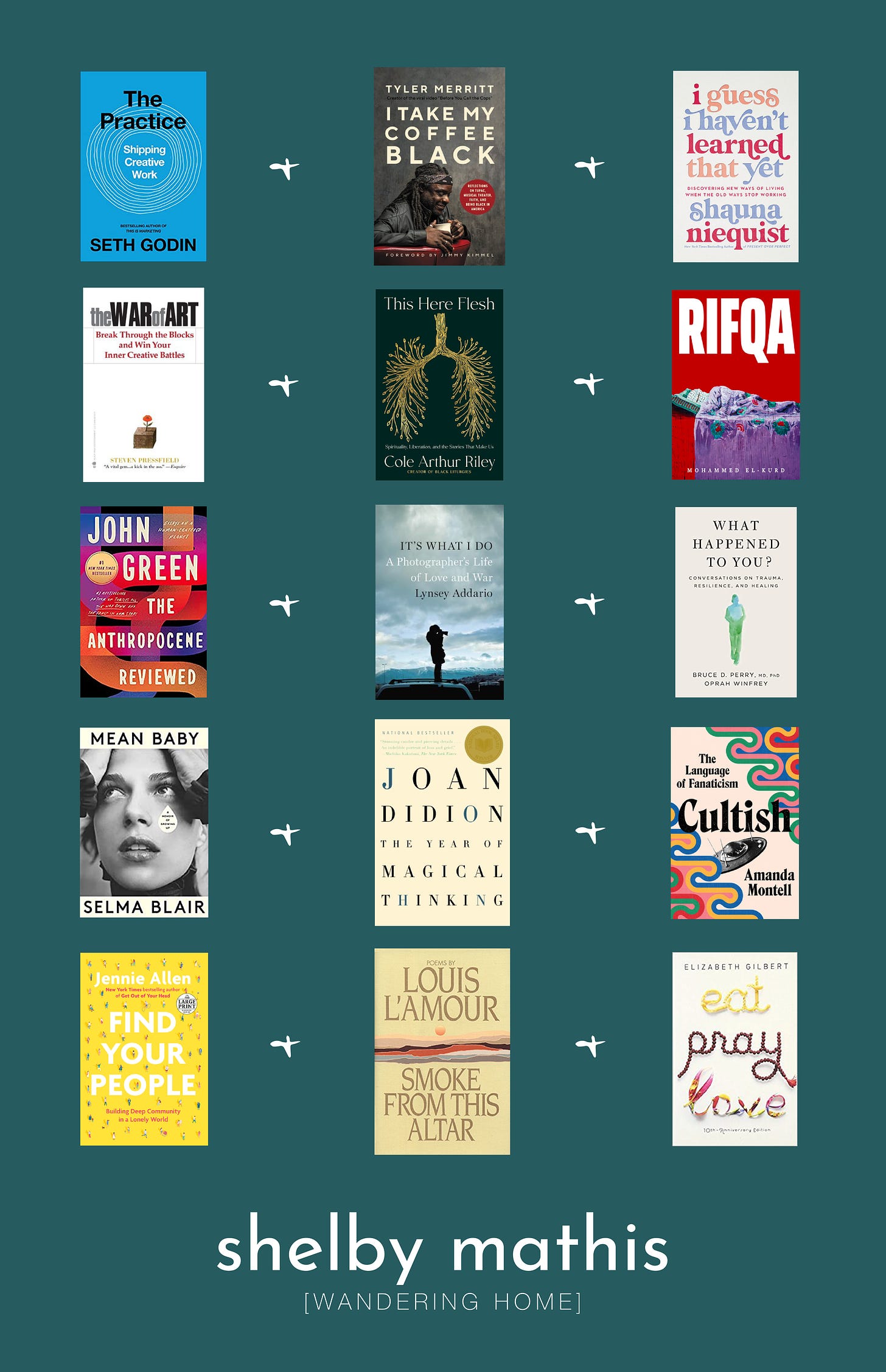A thing I love about this time of year is getting to enjoy more time outside. Don’t you? You can often find me on my patio in the mornings with french press coffee and in the afternoon with a glass of vinho verde in the shade. It’s a ritual for me. The perfect bookends, if you will, to my currently very busy work days.
In this edition of “A spring in books”, I prove a love of reading is genetic or at least contagious (thanks, Dad), and share which books I’ve enjoyed recently.
I’ve been deep-diving into books on creativity, writing, and art. It’s been a fun concentration for the season as I worked on large design projects, took on new clients, wrote consistently here at Wandering Home, and reconnected with other creative pursuits in art and life. I also read some poetry, several books I’d waited for months on from the library, and a few new releases I‘d preordered. It’s been a heck of a season in books.
A highlight
One interesting book I didn’t expect to love was Smoke From This Altar, by the Western author Louis L’Amour. I picked it up because my Dad has begged me to read L’Amour for years. The fact that I hadn’t read one yet was truly unbelievable to him, so, truth be told, the overreaction I could get out of him was enjoyable enough to keep it that way. I’m not a huge fiction reader, which is L’Amour’s typical genre, but when I came across his memoir and poetry collection, I knew I stood a better chance at finishing and perhaps liking the books.
The genre preferences of my Dad and I hardly ever overlap. We don’t always enjoy the recommendations the other makes for us either. He’s into Westerns. I’m into contemplative poetry and feminist and spiritual memoirs. Even as we persist in making terrible recommendations to one another (it’s the thought that counts), we both have our own rich, long histories of reading. We both have highly independent, unashamed dedication to, and self-motivated love of reading. Though our tastes in books couldn’t be more different, reading still reminds me of my Dad.
It’s not just that he also packs too many books on vacation — we’re the same in this way. (His overnight bag for a three-day river floating trip is pictured above. That’s four books.)
It’s not just that we consider sharing long stretches of silence, reading in the same room as “quality time”.
It’s not just that he writes the dates he finishes a book in pencil on the inside cover. Some of them have three, four dates.
It’s not just that when he finds really old books with local historical or familial significance, he can’t wait to show me.
It's not just that when he enters a used bookstore, I already know what he’s hunting for.
It’s that this condition of loving reading and books — I got it somewhere. I saw it modeled somewhere. Having my nose in a book constantly when I was a kid wasn’t just tolerated, but celebrated (by both of my parents.) It’s that reading has been a real gift in my life. I wonder if I’d have fallen for books the way I have without his legacy and passing it on to me. Who really knows?
Anyway, happy Father’s Day, Dad. I finally read a “Western.”
What I read this spring
Here’s my system:
What follows are books I finished in the order I read them. I mark the format/how I read them (🎧📱📙), whether a book was a reread (🥈), and a rating based on the following (entirely subjective) criteria that generally allows me to sort them into favorites. I’m probably too liberal with “favorites”, as there are several, so now you know.
Best books I've read in a long time. Exact book pairing for my season of life. Contender for a lifetime favorite. (⭐⭐⭐)
I LOVED it, have already recommended it to others, will probably reread and give away copies if I haven't already. (⭐⭐)
Really enjoyed its finding me this season. I may reread someday and likely recommend. (⭐)
There are books I start and abandon, and they’re not included here because I don’t leave bad book reviews. I prefer to assume I just wasn’t the right reader at the right time.
I try to be conscious about reading more BIPOC and LGBTQ+ authors, and I mark them too (🖤, 🏳️🌈). This isn’t to signal my virtue, but to be observant and intentional about taking stock of what I’m consuming and who I’m listening to. This intentionality continues to evolve my preferences as I make decisions about what to pick up next. And for this special edition book list, I mark the “Western” and continue to be a living paradox. (🤠)
The Practice: Shipping Creative Work ⭐
by Seth Godin📱
I’ve followed Seth’s blog for years and I’d never read one of his books. I breezed through this quick read of snack-size vignettes about big themes of vocation, creativity, and ethics, which are my speed and interest in a busy season of work. In addition to lofty themes, Seth’s big on tangible solutions, so this one is chock full of not just the “why” of shipping creative work, but the how. I enjoyed this companion as I started writing publicly on Wandering Home, conceiving new creative projects in my design business, and selling art on Etsy recently. Immensely practical for anyone who produces and puts (or wants to put) creative work out in the world.I Take My Coffee Black: Reflections on Tupac, Musical Theater, Faith, and Being Black in America ⭐⭐
by Tyler Merritt 🖤🎧
This is everything I love about memoir: life stories, history lessons, a strong sense of place, comic to no end. I listened to it on audio to enjoy hearing his stories in his own voice, and special guests too, like his beloved mother. Tyler’s an actor, comedian, musician, and founder of The Tyler Merritt Project. He writes about life growing up in Las Vegas and the South, becoming a musical theater kid, embracing his faith, and surviving America. As a 6'2" dreadlocked black man living in the South, Merritt is well aware of stereotypes and their potentially dangerous consequences. In response, Merritt has devoted his creativity to bringing his ethos of “Love. Learn. Create.” to life through his words and films as part of The Tyler Merritt Project, with videos like “Before You Call the Cops” and “These are our kids, Greg.” His messages are powerful calls to connection and action as they challenge us to see our differences as a unifying force for humankind, to call out injustices as they are, and to "get to know me before you call the cops."I Guess I Haven't Learned That Yet: Discovering New Ways of Living When the Old Ways Stop Working ⭐⭐⭐
by Shauna Niequist 📙Shauna’s writing is delicious, and not just the parts about her foodie life in New York City. Amidst life transitions, scandal, and a mid-life crisis, the Niequist family moves from tight-knit suburban Chicago to the heart of Chelsea. As they struggle and adjust, the underlying message is “we don’t have to have that figured out yet”. Through her lovely memoir, she weaves personal narrative with delights like food and long walks and sunsets and even writing itself. She’s a writer's writer, and I love every book she’s ever published. She’s truly one of my favorites, and this one especially delivers on wisdom and permission to let go of perfection. Give this a read if you need to let yourself off the hook now and again.
The War of Art: Winning the Inner Creative Battle ⭐
by Steven Pressfield 📙In a similar vein to The Practice, The War of Art tackles the philosophical questions of why and how makers make, and can keep making when we encounter blocks and distractions. In language and spirit, I thought it leaned a bit too much on the militaristic metaphor, which means to me it borders on the cliché. I was also surprised by the inclusion of a lot of metaphysical and spirituality in this one, which I appreciated even in the times I disagreed with the author’s beliefs or point of view. In all, this was an appreciated book to journey through while I kicked writing, designing, and selling art into high gear this spring.
This Here Flesh: Spirituality, Liberation, and the Stories That Make Us ⭐⭐⭐
by Cole Arthur Riley 🖤📙
I’ve anticipated this memoir from Cole Arthur Riley, the creator of “Black Liturgies”, from the moment she announced it last year, and I pre-ordered it immediately. A few months later, my best friend Maddison told me she had a birthday gift for me, but it wouldn’t be arriving to my house until 2/22/2022 and I connected the dots instantly that she’d ordered me what we both knew would be a perfect match for my reading taste and season of life. To be known so well! This memoir goes down as one of my very favorites. Cole is a gifted, brilliant writer and this book is important. Creators and thinkers like Cole Arthur Riley renew and restore my hope not only in my generation of leaders and culture makers, but for humanity as a whole. I want to always live immersed in the beauty, hope, and creativity of the world and life she’s built, so I’ll keep coming back to this one. It will for sure go in my top books of the 2022.Rifqa ⭐⭐
Poems by Mohammed El-Kurd 🖤📙
The world learned the El-Kurd name when this Palestinian family resisted their forced eviction from their Sheikh Jarrah home in East Jerusalem. The world learned who Mohammed El-Kurd was through his reporting from his besieged neighborhood, and life under Israeli occupation and war, particularly during a violent stretch of ethnic cleansing in 2021. He is not only an effective reporter, he’s a brilliant writer and scholar. Rifqa, named for his grandmother who remembered life before the 1948 expulsion of Palestinians from their land to make way for modern day Israel, is a raw, powerful look into the intimate multigenerational family life of internally displaced refugees facing the threat of being twice displaced, and their home stolen and given to Jewish Israeli settlers. Important, critical read from one of Palestine’s greatest living artists and activists.The Anthropocene Reviewed ⭐⭐⭐
by John Green 📱🎧I didn’t know I needed to read this, and it’s an instant favorite. The essays are from the angle of the life of Earth in the age of humans, with reviews and star ratings for things like Diet Dr Pepper, Googling Strangers, and Viral Meningitis. Beyond the unique structure, Green has a masterful way of weaving personal narrative into relevant history into contextualizing stories about seemingly random, inconsequential things. Maybe that’s the point. It never felt jarring to jump from Plague to Wintery Mix. In fact, it made humanity all the more charming for the time. It’s hard to put words to the heart in this book, but I think you’ll agree it tweaks perspective just enough to help us realign to our proper place in this Anthropocene age of our planet. I give it all the stars.
A highlight: ”I have tried here to map some of the places where my little life brushes up against the big forces shaping contemporary human experience, but the only conclusion I can draw is a simple one: We are so small, and so frail, so gloriously and terrifyingly temporary.”It's What I Do: A Photographer's Life of Love and War ⭐⭐
by Lynsey Addario 📱
I’m a little obsessed with war photographer and foreign news correspondent memoirs. Maybe it’s my adjacent experience working as a photographer in the Middle East with non-profits, or maybe it’s my adjacent experience to war as a former military spouse. Either way, when it’s from a female creative’s perspective, I eat it up. Lynsey is a special breed of woman who just cannot help herself but to be in the action, trained in her skills, armed with her camera. Not only have her images been influential in informing the world of humanitarian disasters and the realities of war, some of them have probably shaped history because the world can respond when we see the truth. She hard-won the right to be boots on the ground in these places, and she has shocking stories to tell. This one’s unforgettable.What Happened to You? Conversations on Trauma, Resilience, and Healing ⭐
by Oprah Winfrey, Dr. Bruce Perry 🖤🎧I zipped through this on a roadtrip because it “reads” like a podcast. Oprah and Dr. Perry sit in conversation for a few hours on how adverse childhood experiences, trauma, and attachment affect our brain development and, therefore, shape our lives forever. They reframe “what’s wrong with you?” and instead ask “what happened to you?” to explain our deep grooves worn by experience, trauma, and intervention. Reading this was a lot like therapy not only because it’s written to guide you to your own “aha moments”, but simply because the sage guidance of Oprah, through her life’s stories and poignant questions, is a perfect match for this subject pointing us toward asking better questions and living better lives.
Mean Baby: A Memoir of Growing Up ⭐
Selma Blair 🎧
I knew this would be a fascinating read, if only to clear up the relentless paparazzi captures and bogus reporting of her personal life. I’ve followed Selma’s work and life for years, from her days in The Sweetest Thing and Legally Blonde to her MS diagnosis and treatment and community advocacy. Her relationship with her mother, her disordered eating and drinking, and her life-long struggle with her health and body were so memorable and relatable. She lays it all bare and it works because we all have our ways of coping with life, even if we weren’t first named “a mean baby”.The Year of Magical Thinking ⭐⭐
by Joan Didion 📙
I took months and months to read this because 1) I needed to savor Didion’s writing in my own time of loss and despair, and 2) I needed to savor her best writing when we lost her in December 2021. In this account of grief and life after loss, Joan achingly and beautifully tells the tragic story of her daughter’s life-threatening illness and her husband’s untimely death while her daughter is on life support. The first days are a blur, the first weeks are a slog, the first year is full of the magical thinking that they should just be able to waltz through the door, and that you could or should have been able to save them, that the bizarre reactions and emotions you felt were real and justified despite your best efforts to keep your shit together. Joan steers us well into the heart of universal and particular grief, and I’m glad I read this deep in the waters of some of my own. I don’t know how she does it: sweeping, impossible themes to tackle matched with the most delicate, tiny moments that made me weep. She’s a legendary writer for good, good reason.Cultish: The Language of Fanaticism ⭐
by Amanda Montell 📱
And the best cover award goes to designer Joanne O'Neill. It's why I picked it up. But the writing is why I stayed. Cultish is long at 319 pages, but it felt like 100. This was a fascinating, engrossing read: topics range from the predictable, like Scientology and Jonestown religious cults, to intriguing fitness clubs and MLM hierarchies that use language and manipulation to gain and keep members and followers and ultimately, fanatics. I was shocked that I knew of every single one of them — they're all mainstream. One of her main points is that our culture is obsessed with cults and the language surrounding them. I’ve been streaming a lot of TV shows about cults lately, so it seems we’re also obsessed with observing and understanding them. If that resonates at all, this book delightfully feeds that monster. I haven't stopped thinking about how Montell's writing has attuned me in fresh ways to the cultish.
A highlight: “[It’s] meaning, purpose, a sense of community, and ritual. Less and less often are seekers finding these things at church. Modern cultish groups also feel comforting in part because they help alleviate the anxious mayhem of living in a world that presents almost too many possibilities for who to be.”Find Your People: Building Deep Community in a Lonely World
by Jennie Allen📱I was once an insatiable reader of all things Jennie Allen, and I picked this one up knowing the premise of “finding your village” would meet me as an avid community builder myself. Jennie founded and leads IF:Gathering, a global womens conference, which I hosted locally at my former church in Denver. Jennie unsurprisingly leans hard into conservative evangelical Christian theology for her idea support, so if you’re deconstructing or find preachy language to be harmful or triggering, skip this book. There were parts even hard for me to read as I’ve journeyed away from conservative evangelicalism. I am not sharing that to leave a bad review of the book, only to frame the thing I do want to say about it: this book highlights how intensely lonely we are (and were before the pandemic that exacerbated this feeling.) Jennie gives practical tools for reaching out, for opening up, and for being a good friend. I appreciated how much she admitted she sucked at all of it (which ironically didn’t discredit her as the teacher but enforced the idea that this better be something we learn together or we’re going to live lonely.) I know this to be true. Taking initiative, choosing vulnerability and deep conversations, and being willing to risk comfort for making connections has always been worth it. I could (and may) write a whole book on this subject, so in a way, reading this title was research. While I don’t see eye to eye these days on some of what Jennie preaches, she does point us in the right direction here with Find Your People.
Smoke From This Altar ⭐
Poems by Louis L’Amour 📙🤠
This is a book of poetry and the renowned Western author’s very first publication. I picked it up, as I already stated, because my Dad presses L’Amour titles into my hand all the time and I really had never gotten around to reading one until I learned of his poetry. This collection spans continents and years and lifestyles. He writes beautifully about nature and the outdoors, as to be expected, but he also writes about home, love, and spirituality. If you like poetry in verse and rhyme, give this one a read. Time will tell if this is a gateway into the Western genre for me, but you can count me a L’Amour fan now either way. I'm savoring this one and can’t wait to add this title to my Dad’s inventory. I couldn’t believe he didn’t own it already.Eat, Pray, Love: One Woman's Search for Everything Across Italy, India, and Indonesia ⭐⭐⭐
by Elizabeth Gilbert 🏳️🌈📙🥈I leave for my sabbatical in Italy in three months, and people keep reminding me this is required reading. This was my fourth or fifth reread, so I knew the treasures in store. Liz finds herself trapped in a failed marriage on a trajectory to having a life she doesn’t recognize as her own, so in the midst of a brutal divorce and a romantic fling, she packs her bags and moves from New York City to Rome, where she learns Italian and eats pasta and falls back in love with her life. Later, she lives at an ashram in India to learn about devotion, and finds the love of her life in Bali. There’s a reason this book is an unbelievably popular NYT Bestseller and comes off my shelves to be reread every couple of years. It’s an unforgettable tale of embracing pleasure and building the life you actually want, even if it means changing your mind along the way.
A highlight: “It was interesting for me to discover what I did not want to do in Italy, once I'd given myself executive authorization to enjoy my experience there … You have to kind of declare a pleasure major here, or you'll get overwhelmed … I didn't even want to look at that much art. I am a bit ashamed to admit this, but I did not visit a single museum during my entire four months in Italy … I found that all I really wanted was to eat beautiful food and to speak as much beautiful Italian as possible. That was it. So I declared a double major, really — in speaking and in eating (with a concentration on gelato).”
That’s all for my spring reads. What caught your eye? I get most of my best book recommendations from friends and writers, so I hope to hear from you if you’re a reader. Let me know in the post comments if you’ve read any of these. What are you reading this summer, and what books should I add to my list?
Happy reading,
P.S. This summer, I’m reading books I already own in hopes to get through more stuff on my own shelves. I’m currently reading Why Design Matters, by Debbie Millman, Freedom Is a Constant Struggle, by Angela Davis, and Braiding Sweetgrass, by Robin Wall Kimmerer. If you’re a book person and missed the last quarterly edition of “A season in books”, here’s winter 2021-22 again!









